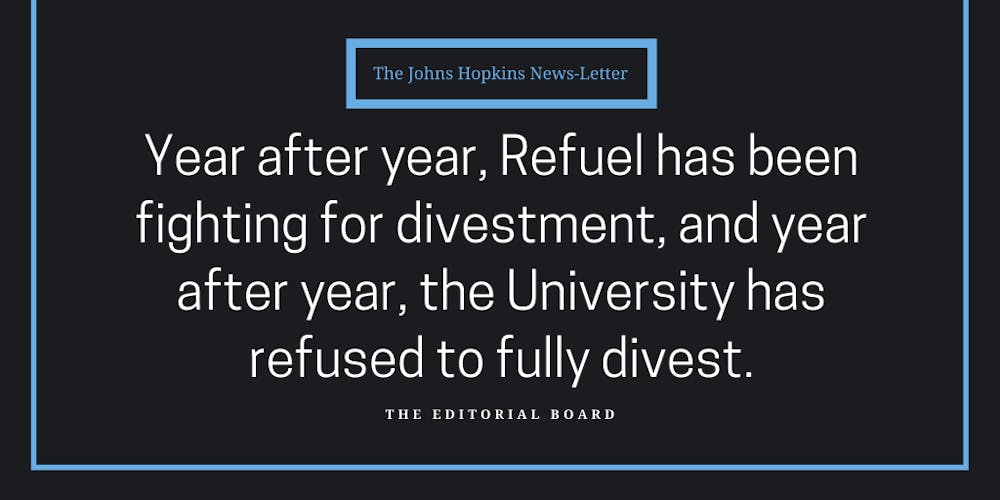Since 2012, college students across the U.S. have been calling on their universities to divest from fossil fuel companies. At Hopkins, student group Refuel Our Future (Refuel) has been leading the fight for divestment. In November 2019, student protesters at Harvard and Yale disrupted the Harvard-Yale football game to call on their universities to divest. At over 50 universities, Hopkins included, students held events to recognize Fossil Fuel Divestment Day.
Too often, the fight for divestment may seem futile. Many of our peer institutions, including all eight Ivy League universities, have not fully divested from the fossil fuel industry. At Hopkins, Refuel submitted a proposal to the Public Interest Investment Advisory Committee (PIIAC) in December 2015 asking the Board of Trustees to divest from all fossil fuels. Two years later, PIIAC recommended that the Board divest from all of its fossil fuel holdings, but to this day the Board has only divested from thermal coal. The administration has never offered a thorough explanation for why it did not follow through with PIIAC’s recommendations.
Yet we have also seen landmark achievements. On Feb. 6, Georgetown University announced that it would be divesting its endowment from holdings in fossil fuels after student group GU Fossil Free pushed for divestment for eight years. The plan includes the phasing out of direct public fossil fuel assets within the next five years and the end of direct private fossil fuel assets within 10 years. Four months prior, the University of California School System announced that its $13.4 billion endowment would be fossil fuel free within a month, with its $70 billion pension fund to follow.
While it is too early to tell, these decisions may incentivize other powerful universities to finally divest. And Hopkins must look to Georgetown and the UC Schools as examples. Year after year, Refuel has been fighting for divestment, and year after year, the University has refused to fully divest. If Hopkins prides itself on being a leader and responsible innovator among higher education institutions, what better way is there to uphold these values than to divest completely from fossil fuels?
It is true that Hopkins has made strides for environmental sustainability. Meatless Mondays, now practiced across the U.S., began in the Bloomberg School of Public Health. Our dining facilities are compost-friendly. In April 2019, President Ronald J. Daniels announced the University’s decision to purchase 253,000 megawatt hours of solar power a year starting in 2021. “We look forward to working with you to make Johns Hopkins a global leader in environmental stewardship,” Daniels wrote.
While we applaud this move to more renewable sources of energy, Hopkins will never truly be a leader in sustainability unless it divests completely.
We firmly believe that the University needs to continue to be a leader in addressing global environmental change and its related public health implications. Hopkins has the opportunity to make a statement and to show support for the health and well-being of people around the world.
Those who opposed divestment from fossil fuel companies say that divestment is nothing more than a pointless gesture. We understand that Hopkins divesting will not singlehandedly solve the climate crisis. As a leading institution, however, it can inspire other universities. Together, we can send a message that as a country, we must shift away once and for all from fossil fuel consumption.
Georgetown’s divestment has inspired students across the country to demand the same from their universities. We note too that Georgetown’s decision comes just four months after the UC Schools’ decision to divest. Already the domino effect is beginning. An institution like Hopkins can give even greater momentum to the cause.
Hopkins needs to take a stand for what is right. As the Board of Trustees Committee on Investments stated, the University’s mission is to “bring the benefits of discovery to the world.” The dangers of fossil fuels are known — they contribute to air pollution and are non-renewable. Hopkins acknowledged this in the Trustees report. How can the University argue that protecting their endowment carries out their mission more than supporting environmental issues that threaten the future of our planet?
Hopkins and other peer institutions are also reluctant to divest because they do not want to lower the value of their endowments. Some argue that divestment will mean less money for University programs and less financial aid for lower-income students. Yet the Board of Trustees has not yet demonstrated whether divestment will have such an impact. Until it does, we will maintain our stance that the University should not be financially linked with companies that contribute so heavily to climate change. We should not be investing in a public health hazard that disproportionately affects low-income and minority communities.
After Georgetown’s victory, we have reached an opportune moment to escalate the campaign for divestment. We cannot let it lose momentum. Refuel cannot lead this fight alone, and their fight is far from over.
Ultimately, regardless of how hard students fight, the decision to divest lies with Hopkins. It is past time that the University acts in our interests. They know that the majority of students want the University to divest fully. The results of the 2018-2019 SGA referendum revealed that over 79 percent of students who answered the poll voted in favor of the Board of Trustees divesting from all fossil fuels.
Georgetown is just one example of a leading institution that successfully decided to leave behind the fossil fuel industry. We can do the same. We hope that Hopkins follows in Georgetown’s footsteps and makes the ethical and environmentally conscious choice.





